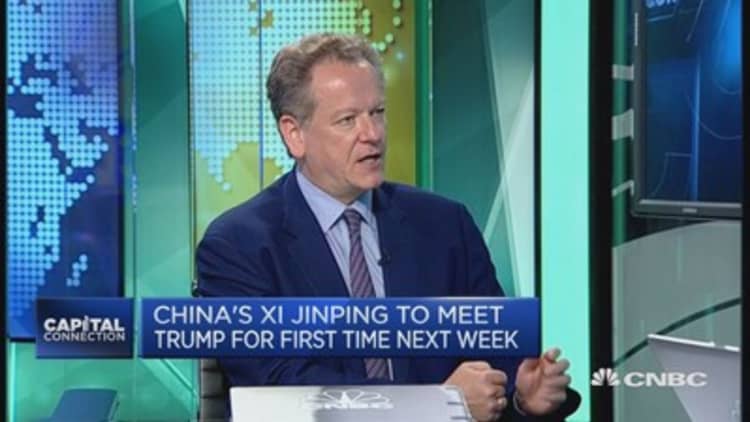
Eager to partake in a U.S. infrastructure boom, Beijing will need to make things easier for American companies in China.
Participants in the planned $1 trillion infrastructure spending "could be Asian investors," said Jamie Metzl, a senior fellow at the Atlantic Council. "But it will likely only be Chinese investors if there is greater reciprocal access for American companies in China."
President Donald Trump has promised upgrades in areas such as transportation, prompting Japanese Prime Minister Shinzo Abe to play up how Japan's technical expertise in high-speed rail could bring jobs to the United States. The head of a major Chinese city's commerce commission told CNBC in March that Chinese companies could also compete for U.S. projects.
The challenge when Chinese President Xi Jinping visits the U.S. this week is to convince an "America First" president that infrastructure is an area where the two countries can work together — despite all of Trump's criticisms of China.

"Here President Xi will be strategic in saying infrastructure investment, collaboration with American companies, this might actually help, given the U.S. budget is under such pressure," said Yukon Huang, a senior fellow, Asia Program, Carnegie Endowment for International Peace.
The catch is, U.S. companies are not treated half as well in China as they are in Japan. In a 2016 World Bank ranking of best countries to do business with, Japan was 34th and China was 78th. The U.S. was near the top at 8.
Rampant counterfeiting, regulatory
China usually gets unimpeded access to the USA
On the other hand, Chinese companies usually have far easier access to American businesses. Large enterprises, often tied to the Communist government, have made high-profile purchases such as Smithfield Foods and the Waldorf Astoria hotel. Chinese foreign direct investment in the U.S. tripled in 2016 from the year before, to $46 billion, according to the Rhodium Group.
Trump may change all that. One area in which the U.S. could alter its regulation on Chinese investment is through the Committee on Foreign Investment in the United States (CFIUS). The committee reviews Chinese deals in the U.S. for security issues, and analysts say the Trump administration may expand its purview to address the disparity in access.
"CFIUS will very, very likely be broadened in order to address the big challenge of nonreciprocal and
The Treasury, which oversees CFIUS, did not immediately respond to a CNBC request for comment.
However, Jack Lew, Treasury secretary under President Barack Obama, argued on March 29 that "CFIUS turning into trade versus national security would be a mistake." He was speaking on a panel of former Treasury secretaries hosted by the National Committee on U.S.-China Relations.
China and capital flight
For all its interest in overseas deals and U.S. infrastructure projects, China has its own reasons to try to keep money inside its borders. Wealthy Chinese and some Chinese companies are trying persistently to get their money out of the country, but capital flight could cause the yuan to weaken — reviving bad memories of when sharp drops in the yuan rocked global markets.
Rhodium's March analysis found that the pace of dealmaking in February slowed to a two-year low as Beijing stepped up efforts to block money from fleeing the country.
Regardless of political pressure on both sides, Chinese investment in the U.S. is expected to remain healthy.
"My perception is the China-Hollywood partnership will continue to expand. We may be in a
"There are protectionist winds blowing on both sides of the Pacific. I believe they will subside," he said. "Deals are still being discussed and done."
Watch: Chinese want Xi to dodge 'embarrassments' with Trump


